人教版七年级下册英语Unit 4 Don't eat in class.Section A 2d&Grammar Focus (共33张ppt)
文档属性
| 名称 | 人教版七年级下册英语Unit 4 Don't eat in class.Section A 2d&Grammar Focus (共33张ppt) |
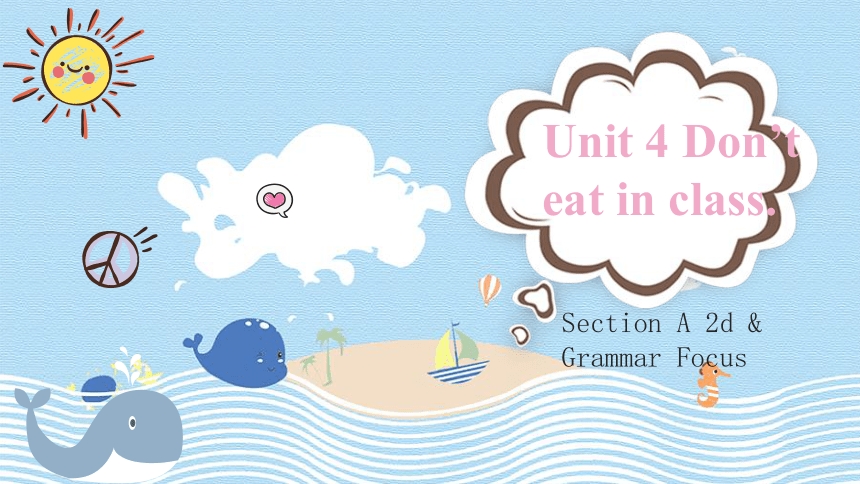
|
|
| 格式 | pptx | ||
| 文件大小 | 987.0KB | ||
| 资源类型 | 教案 | ||
| 版本资源 | 人教新目标(Go for it)版 | ||
| 科目 | 英语 | ||
| 更新时间 | 2021-02-06 00:00:00 | ||
图片预览

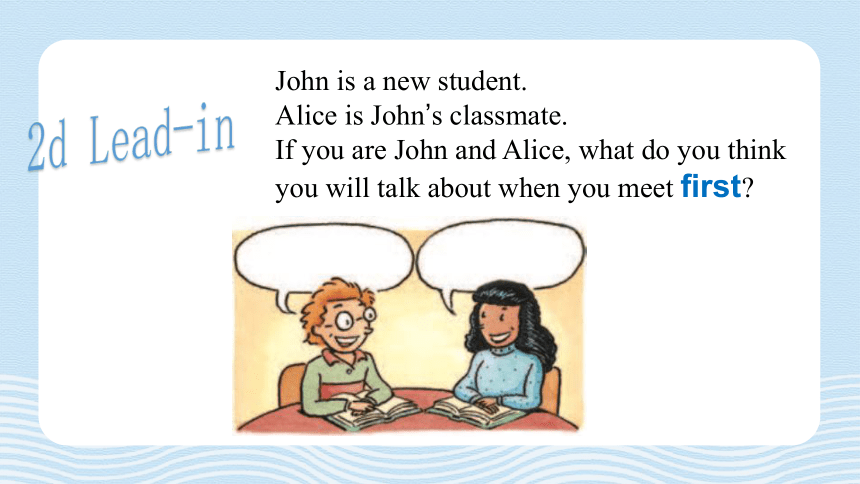
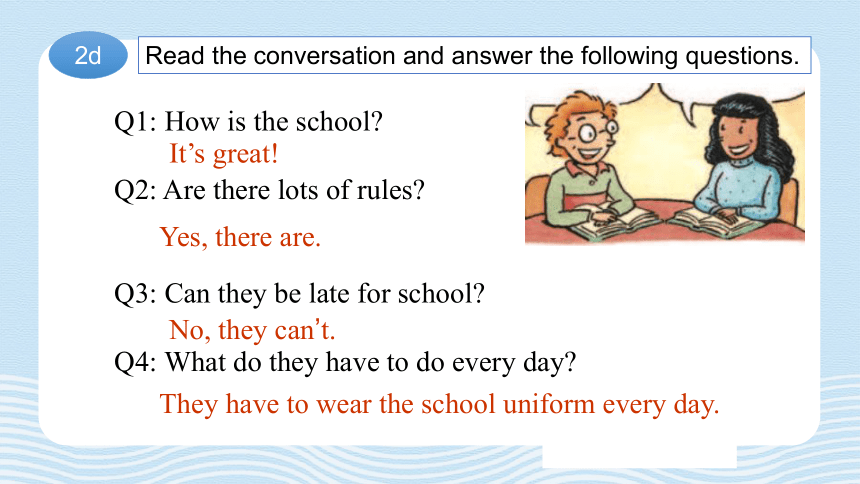
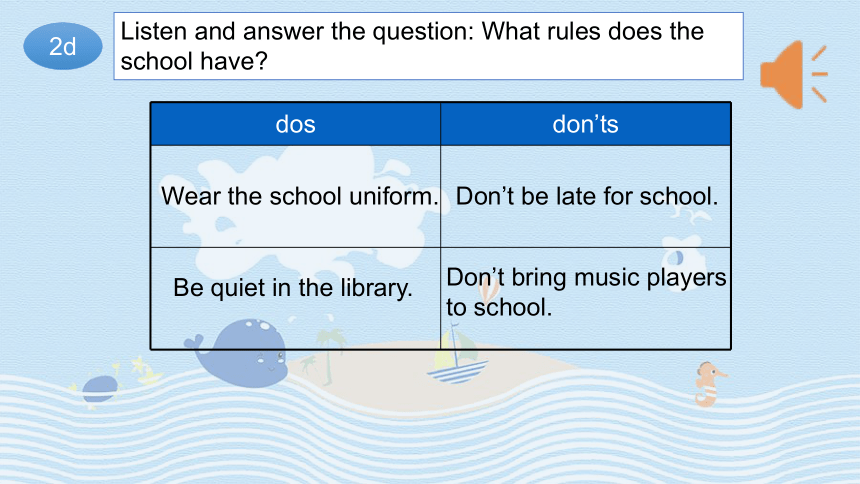
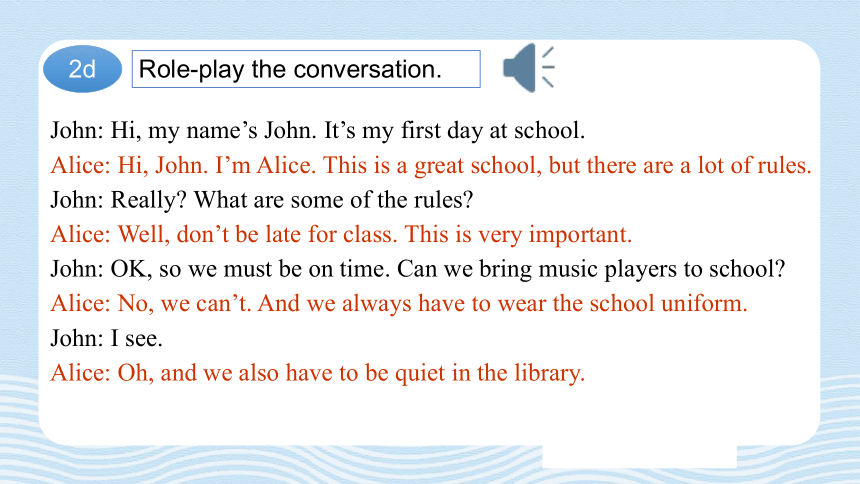
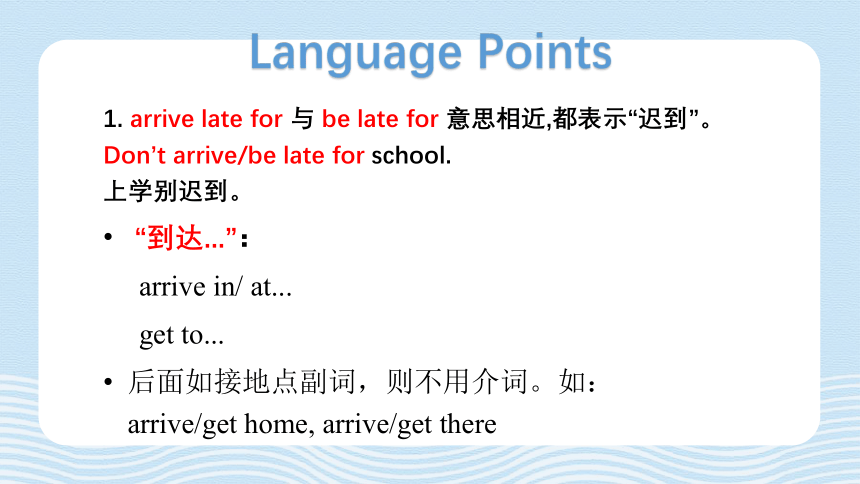

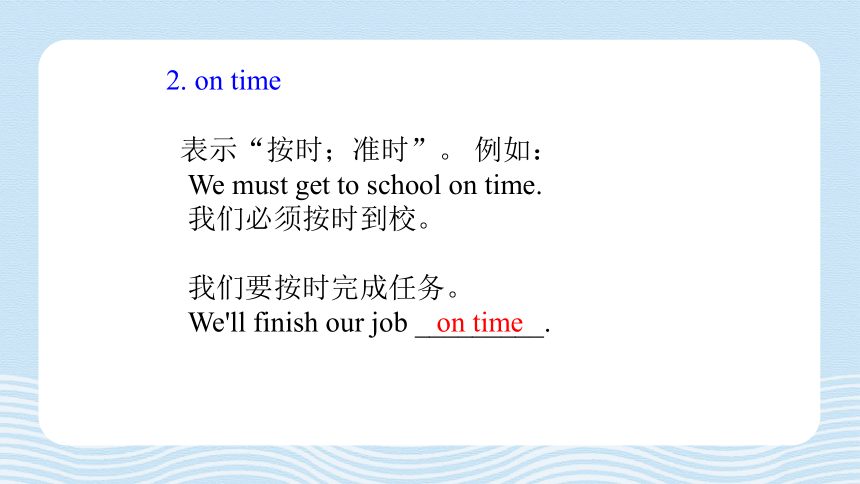
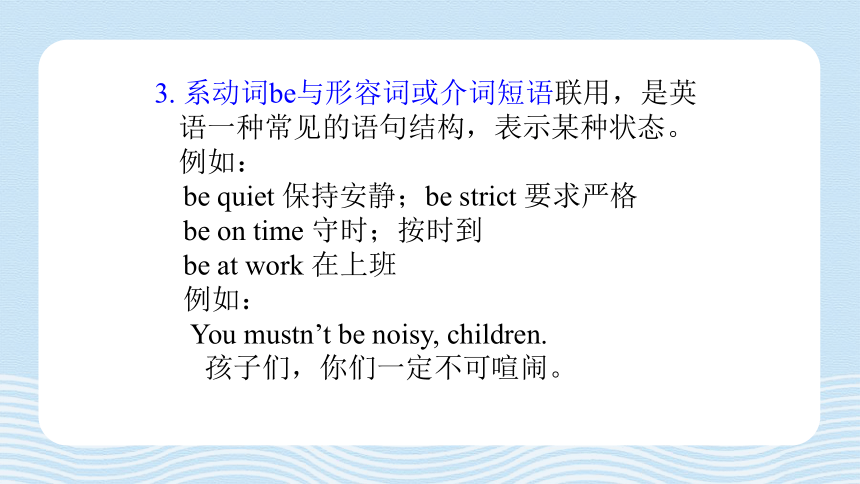
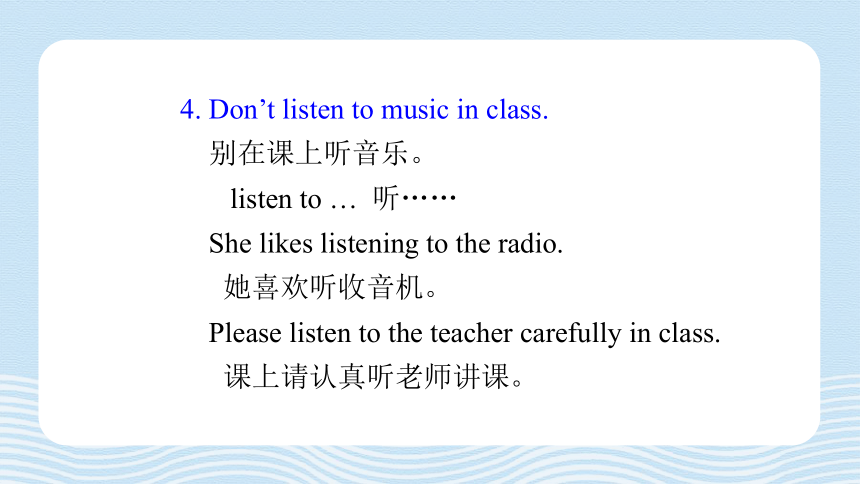
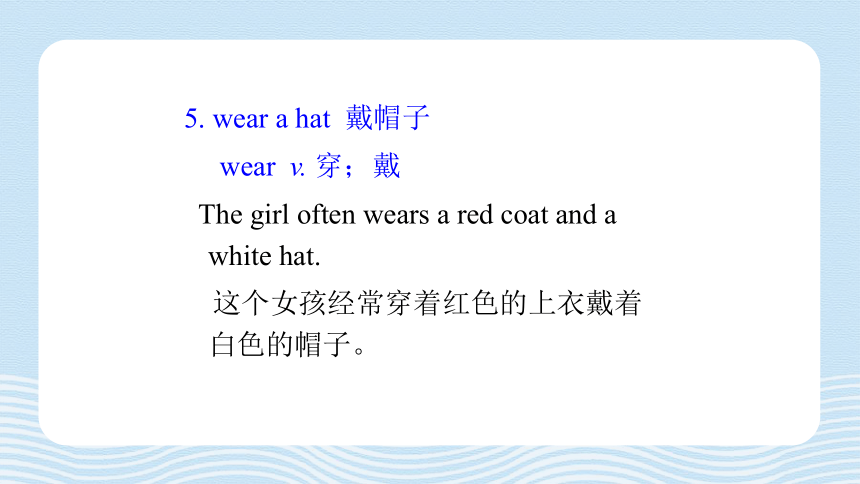
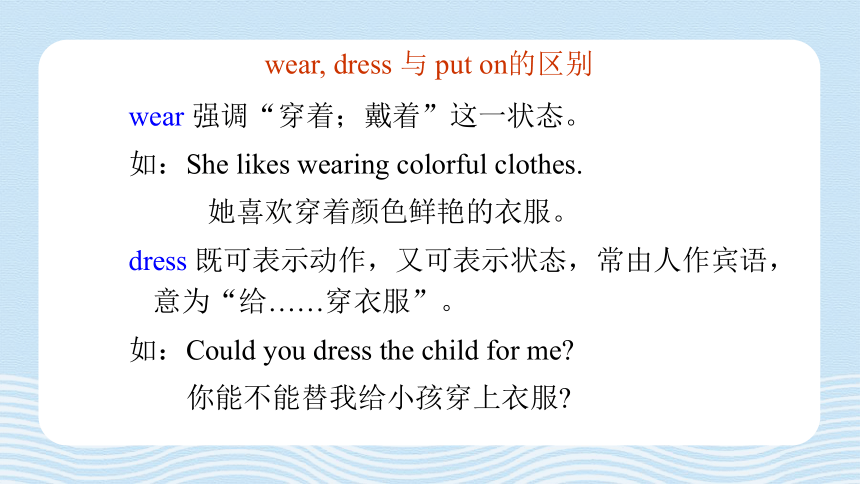
文档简介
Section A 2d & Grammar Focus
Unit 4 Don’t eat in class.
2d Lead-in
John is a new student.
Alice is John’s classmate.
If you are John and Alice, what do you think
you will talk about when you meet first?
Q1: How is the school?
Q2: Are there lots of rules?
Q3: Can they be late for school?
Q4: What do they have to do every day?
It’s great!
Yes, there are.
No, they can’t.
They have to wear the school uniform every day.
2d
Read the conversation and answer the following questions.
dos
don’ts
Wear the school uniform.
Be quiet in the library.
Don’t be late for school.
Don’t bring music players to school.
2d
Listen and answer the question: What rules does the school have?
John: Hi, my name’s John. It’s my first day at school.
Alice: Hi, John. I’m Alice. This is a great school, but there are a lot of rules.
John: Really? What are some of the rules?
Alice: Well, don’t be late for class. This is very important.
John: OK, so we must be on time. Can we bring music players to school?
Alice: No, we can’t. And we always have to wear the school uniform.
John: I see.
Alice: Oh, and we also have to be quiet in the library.
2d
Role-play the conversation.
1. arrive?late?for?与 be?late?for?意思相近,都表示“迟到”。
Don’t?arrive/be late?for?school.
上学别迟到。
“到达...”:
arrive in/ at...
get to...
后面如接地点副词,则不用介词。如:arrive/get home, arrive/get there
Language Points
1.-----When did your uncle ______ in Shanghai?
-----The day before yesterday.
A. arrive B. get
2. If you _____ too late, the host will be unhappy.
A. arrive B. get to C. arrive at
3. __________ (not arrive) late for class.
A
A
Don’t arrive
2. on time
表示“按时;准时”。 例如:
We must get to school on time.
我们必须按时到校。
我们要按时完成任务。
We'll finish our job _________.
on time
3. 系动词be与形容词或介词短语联用,是英语一种常见的语句结构,表示某种状态。例如:
be quiet 保持安静;be strict 要求严格
be on time 守时;按时到
be at work 在上班
例如:
You mustn’t be noisy, children.
孩子们,你们一定不可喧闹。
4. Don’t listen to music in class.
别在课上听音乐。
listen to … 听……
She likes listening to the radio.
她喜欢听收音机。
Please listen to the teacher carefully in class.
课上请认真听老师讲课。
5. wear a hat 戴帽子
wear v. 穿;戴
The girl often wears a red coat and a white hat.
这个女孩经常穿着红色的上衣戴着白色的帽子。
wear 强调“穿着;戴着”这一状态。
如:She likes wearing colorful clothes.
她喜欢穿着颜色鲜艳的衣服。
dress 既可表示动作,又可表示状态,常由人作宾语, 意为“给……穿衣服”。
如:Could you dress the child for me?
你能不能替我给小孩穿上衣服?
wear, dress 与 put on的区别
当表示自己穿衣服时,一般用“get dressed (= dress oneself)”. 如:
He cannot get dressed (dress himself).
他不会自己穿衣服。
当dress表示状态时,一般要用“be dressed in”(= be in)的形式。如:
She is dressed in a red coat. 她穿着一件红色的上衣。
put on 着重于“穿”这一动作,即由没穿到穿这一过程的完成,意为“穿上”。如:
Please put on your new coat.
请穿上你的新大衣。
用 wear, put on, dress 的适当形式填空。
She is _________ a red flower in her hair.
2. He ________ his coat and goes out.
3. He is _________ black.
wearing
puts on
dressed in
6. Can we bring music players to school?
我们能把音乐播放机带到学校来吗?
bring v. 带来;取来
Can you bring me an English dictionary?
你能给我带来一本英语字典吗?
bring 与 take 的区别
Bring your homework here, and take the book away.
把你的作业拿过来,把这本书带走。
bring 指往里带(带来),而take 则指往外带(带走)。
---Why do Chinese people like red?
---Because they think it can ____ them good luck.
A. carry B. bring C. make D. take
B
{22838BEF-8BB2-4498-84A7-C5851F593DF1}Don’t run in the hallways.
Don’t fight.
What are the rules?
We must be on time for class.
Can we eat in the classroom?
No, we can’t, but we can eat in the dining hall.
Can we wear a hat in class?
Yes, we can./No, we can’t.
Does he have to wear a uniform at school?
Yes, he does./No, he doesn’t.
What do you have to do?
We have to be quiet in the library.
2. 祈使句的否定句怎么样构成的?肯定句呢?一般什么情况下使用祈使句?
1. 圈出情态动词,情态动词在用法上有什么共同点?
3. can在本单元主要表示什么含义?它还可以表达什么意思?
4. have to在句法上与其他情态动词的区别?
Grammar
Focus
Examples:
肯定祈使句 否定祈使句
Sit down.
Come in.
Eat at home.
Listen to music outside.
5. Do your homework at school.
Don’t sit down.
Don’t come in .
Don’t eat at home.
Don’t listen to music outside.
Don’t do your homework at school.
表示请求,建议,命令,禁止等语气的句子, 其结构为省去主语you, 以动词原形开头 。
祈使句
句子结构
(1) 肯定句:__________+ 其他
请在餐厅里吃东西。
_______________________________
动词原形
Please eat in the dining hall.
(2) 否定句: _____ + _________ + 其他
不要和同学们打架。
_______________________________
不要在教室里打篮球。
________________________________
Don’ t 动词原形
Don’t fight with your classmates.
Don’t play basketball in the classroom.
祈使句
(3)以let开头的句子也是祈使句的一种结构,常用
于第一、三人称,表示建议、邀请和劝说。
____+ sb.+动词原形
让我们步行去上学吧。 _________________
让我告诉你我的学校生活。_______________________________
让他进来吧。
________________________________
Let
Let’s walk to school.
Let me tell you my school life.
Let him com in.
Talk about your school day. What can you do? What must you do? What do you have to do?
Then make a list.
感受情态动词must , have to ,can的语境用法
must 作为情态动词,表示“必须,务必”。
例如:You must come tomorrow.
你明天务必要来。
注:在回答must引起的问句时,如果是否定的答复,
用don’t have to或needn’t (不必) , 但不能用mustn’t (不允许, 禁止) 。
must
have to意思是“必须,不得不”,侧重于客观上的必要。
结构: 主语+have?to+动词原形+其他 (一般现在时)
主语是第三人称单数时, 用has?to;
如:
The train leaves at 2:40. I have to get to the station before 2:30.?
火车两点四十开走,我必须在两点半之前到达火车站。
Tom?has?to?practice?the?guitar?every?day.?
汤姆每天必须练习弹吉他。
have to
2) 否定形式: 主语+don’t?have?to+动词原形+其他(一般现在时)
主语是第三人称单数时, 用doesn’t?have?to(“不必”);
Nick?doesn’t?have?to?wear?a?uniform.尼克不必穿制服。
We?didn’t?have?to?do?our?homework?at?once.?
我们不必马上完成作业。
3) 疑问句: Do(Does)+主语+have?to?+动词原形+其他?
如:
—Do?you?have?to?stay?at?home?on?weekends??
周末你必须待在家里吗?
—Yes,?I?do.?/?No,?I?don't.?是的,我必须。/ 不, 我不必。
have to vs. must
1) have to意为“必须,不得不”,强调客观需要。
2) must 意为“必须”,强调说话人的主观看法,语气比较强烈。
如:
I must go now.
It’s late and I have to go now.
练一练:用have to, must 填空
1. It’s cold outside. We ______ stay at
home.
2. We ____ be good with our parents.
have to
must
1) 表示能力,“能,会”。如:
He can speak English very well.?
2) 表示许可、允许,“可以”。如:
You can play basketball on weekends.?
3) 表示请求。如:
Can you help me with my math??
can
--- ______ ask you some questions?
--- Sure.
A. Do you B. Will you
C. Can I D. Must I
-Dad, may I watch TV?
-No, you can’t. You _______ finish your homework first.
A. must B. can C. may
C
A
Exercises
1.No talking.
2.No eating.
3. No music.
4.No photos.
Library Rules
1._____________
2._____________
3._____________
4._____________
Don’t talk.
Don’t eat.
Don’t listen to music.
Don’t take photos.
3a
Write the rules for the school library.
No + v.-ing/ n.
表示“禁止、规劝”
Don't smoke.
Don't park here.
Don't use mobile phones.
Do you know these signs?
The best school rules
1. We can eat in class.
2. We don’t have to come to
school every day.
3. ...
4. ...
At our dream school, we don’t have to come
to school every day. We …
groupwork
3c
Make up five cool rules for your dream school. Share your rules with the class. Your classmates vote for the Coolest School!
1. He has to eat breakfast quickly. (改为一般疑问句)
__________________________________
2. Play volleyball after class. (改为否定句)
________________________________
句型转换
Does he have to eat breakfast quickly?
Don’t play volleyball after class.
Exercises
3. We can wear sports shoes in class. (改为一般疑问) ______________________________
4. Don’t arrive late for class. (改为同义句)
_______________________________
5. Eric has to do his homework before six. (对划线部分提问)
___________________________________
Can we wear sports shoes in class?
We must be on time for class.
What does Eric have to do before six?
Unit 4 Don’t eat in class.
2d Lead-in
John is a new student.
Alice is John’s classmate.
If you are John and Alice, what do you think
you will talk about when you meet first?
Q1: How is the school?
Q2: Are there lots of rules?
Q3: Can they be late for school?
Q4: What do they have to do every day?
It’s great!
Yes, there are.
No, they can’t.
They have to wear the school uniform every day.
2d
Read the conversation and answer the following questions.
dos
don’ts
Wear the school uniform.
Be quiet in the library.
Don’t be late for school.
Don’t bring music players to school.
2d
Listen and answer the question: What rules does the school have?
John: Hi, my name’s John. It’s my first day at school.
Alice: Hi, John. I’m Alice. This is a great school, but there are a lot of rules.
John: Really? What are some of the rules?
Alice: Well, don’t be late for class. This is very important.
John: OK, so we must be on time. Can we bring music players to school?
Alice: No, we can’t. And we always have to wear the school uniform.
John: I see.
Alice: Oh, and we also have to be quiet in the library.
2d
Role-play the conversation.
1. arrive?late?for?与 be?late?for?意思相近,都表示“迟到”。
Don’t?arrive/be late?for?school.
上学别迟到。
“到达...”:
arrive in/ at...
get to...
后面如接地点副词,则不用介词。如:arrive/get home, arrive/get there
Language Points
1.-----When did your uncle ______ in Shanghai?
-----The day before yesterday.
A. arrive B. get
2. If you _____ too late, the host will be unhappy.
A. arrive B. get to C. arrive at
3. __________ (not arrive) late for class.
A
A
Don’t arrive
2. on time
表示“按时;准时”。 例如:
We must get to school on time.
我们必须按时到校。
我们要按时完成任务。
We'll finish our job _________.
on time
3. 系动词be与形容词或介词短语联用,是英语一种常见的语句结构,表示某种状态。例如:
be quiet 保持安静;be strict 要求严格
be on time 守时;按时到
be at work 在上班
例如:
You mustn’t be noisy, children.
孩子们,你们一定不可喧闹。
4. Don’t listen to music in class.
别在课上听音乐。
listen to … 听……
She likes listening to the radio.
她喜欢听收音机。
Please listen to the teacher carefully in class.
课上请认真听老师讲课。
5. wear a hat 戴帽子
wear v. 穿;戴
The girl often wears a red coat and a white hat.
这个女孩经常穿着红色的上衣戴着白色的帽子。
wear 强调“穿着;戴着”这一状态。
如:She likes wearing colorful clothes.
她喜欢穿着颜色鲜艳的衣服。
dress 既可表示动作,又可表示状态,常由人作宾语, 意为“给……穿衣服”。
如:Could you dress the child for me?
你能不能替我给小孩穿上衣服?
wear, dress 与 put on的区别
当表示自己穿衣服时,一般用“get dressed (= dress oneself)”. 如:
He cannot get dressed (dress himself).
他不会自己穿衣服。
当dress表示状态时,一般要用“be dressed in”(= be in)的形式。如:
She is dressed in a red coat. 她穿着一件红色的上衣。
put on 着重于“穿”这一动作,即由没穿到穿这一过程的完成,意为“穿上”。如:
Please put on your new coat.
请穿上你的新大衣。
用 wear, put on, dress 的适当形式填空。
She is _________ a red flower in her hair.
2. He ________ his coat and goes out.
3. He is _________ black.
wearing
puts on
dressed in
6. Can we bring music players to school?
我们能把音乐播放机带到学校来吗?
bring v. 带来;取来
Can you bring me an English dictionary?
你能给我带来一本英语字典吗?
bring 与 take 的区别
Bring your homework here, and take the book away.
把你的作业拿过来,把这本书带走。
bring 指往里带(带来),而take 则指往外带(带走)。
---Why do Chinese people like red?
---Because they think it can ____ them good luck.
A. carry B. bring C. make D. take
B
{22838BEF-8BB2-4498-84A7-C5851F593DF1}Don’t run in the hallways.
Don’t fight.
What are the rules?
We must be on time for class.
Can we eat in the classroom?
No, we can’t, but we can eat in the dining hall.
Can we wear a hat in class?
Yes, we can./No, we can’t.
Does he have to wear a uniform at school?
Yes, he does./No, he doesn’t.
What do you have to do?
We have to be quiet in the library.
2. 祈使句的否定句怎么样构成的?肯定句呢?一般什么情况下使用祈使句?
1. 圈出情态动词,情态动词在用法上有什么共同点?
3. can在本单元主要表示什么含义?它还可以表达什么意思?
4. have to在句法上与其他情态动词的区别?
Grammar
Focus
Examples:
肯定祈使句 否定祈使句
Sit down.
Come in.
Eat at home.
Listen to music outside.
5. Do your homework at school.
Don’t sit down.
Don’t come in .
Don’t eat at home.
Don’t listen to music outside.
Don’t do your homework at school.
表示请求,建议,命令,禁止等语气的句子, 其结构为省去主语you, 以动词原形开头 。
祈使句
句子结构
(1) 肯定句:__________+ 其他
请在餐厅里吃东西。
_______________________________
动词原形
Please eat in the dining hall.
(2) 否定句: _____ + _________ + 其他
不要和同学们打架。
_______________________________
不要在教室里打篮球。
________________________________
Don’ t 动词原形
Don’t fight with your classmates.
Don’t play basketball in the classroom.
祈使句
(3)以let开头的句子也是祈使句的一种结构,常用
于第一、三人称,表示建议、邀请和劝说。
____+ sb.+动词原形
让我们步行去上学吧。 _________________
让我告诉你我的学校生活。_______________________________
让他进来吧。
________________________________
Let
Let’s walk to school.
Let me tell you my school life.
Let him com in.
Talk about your school day. What can you do? What must you do? What do you have to do?
Then make a list.
感受情态动词must , have to ,can的语境用法
must 作为情态动词,表示“必须,务必”。
例如:You must come tomorrow.
你明天务必要来。
注:在回答must引起的问句时,如果是否定的答复,
用don’t have to或needn’t (不必) , 但不能用mustn’t (不允许, 禁止) 。
must
have to意思是“必须,不得不”,侧重于客观上的必要。
结构: 主语+have?to+动词原形+其他 (一般现在时)
主语是第三人称单数时, 用has?to;
如:
The train leaves at 2:40. I have to get to the station before 2:30.?
火车两点四十开走,我必须在两点半之前到达火车站。
Tom?has?to?practice?the?guitar?every?day.?
汤姆每天必须练习弹吉他。
have to
2) 否定形式: 主语+don’t?have?to+动词原形+其他(一般现在时)
主语是第三人称单数时, 用doesn’t?have?to(“不必”);
Nick?doesn’t?have?to?wear?a?uniform.尼克不必穿制服。
We?didn’t?have?to?do?our?homework?at?once.?
我们不必马上完成作业。
3) 疑问句: Do(Does)+主语+have?to?+动词原形+其他?
如:
—Do?you?have?to?stay?at?home?on?weekends??
周末你必须待在家里吗?
—Yes,?I?do.?/?No,?I?don't.?是的,我必须。/ 不, 我不必。
have to vs. must
1) have to意为“必须,不得不”,强调客观需要。
2) must 意为“必须”,强调说话人的主观看法,语气比较强烈。
如:
I must go now.
It’s late and I have to go now.
练一练:用have to, must 填空
1. It’s cold outside. We ______ stay at
home.
2. We ____ be good with our parents.
have to
must
1) 表示能力,“能,会”。如:
He can speak English very well.?
2) 表示许可、允许,“可以”。如:
You can play basketball on weekends.?
3) 表示请求。如:
Can you help me with my math??
can
--- ______ ask you some questions?
--- Sure.
A. Do you B. Will you
C. Can I D. Must I
-Dad, may I watch TV?
-No, you can’t. You _______ finish your homework first.
A. must B. can C. may
C
A
Exercises
1.No talking.
2.No eating.
3. No music.
4.No photos.
Library Rules
1._____________
2._____________
3._____________
4._____________
Don’t talk.
Don’t eat.
Don’t listen to music.
Don’t take photos.
3a
Write the rules for the school library.
No + v.-ing/ n.
表示“禁止、规劝”
Don't smoke.
Don't park here.
Don't use mobile phones.
Do you know these signs?
The best school rules
1. We can eat in class.
2. We don’t have to come to
school every day.
3. ...
4. ...
At our dream school, we don’t have to come
to school every day. We …
groupwork
3c
Make up five cool rules for your dream school. Share your rules with the class. Your classmates vote for the Coolest School!
1. He has to eat breakfast quickly. (改为一般疑问句)
__________________________________
2. Play volleyball after class. (改为否定句)
________________________________
句型转换
Does he have to eat breakfast quickly?
Don’t play volleyball after class.
Exercises
3. We can wear sports shoes in class. (改为一般疑问) ______________________________
4. Don’t arrive late for class. (改为同义句)
_______________________________
5. Eric has to do his homework before six. (对划线部分提问)
___________________________________
Can we wear sports shoes in class?
We must be on time for class.
What does Eric have to do before six?
同课章节目录
- Unit 1 Can you play the guitar?
- Section A
- Section B
- Unit 2 What time do you go to school?
- Section A
- Section B
- Unit 3 How do you get to school?
- Section A
- Section B
- Unit 4 Don't eat in class.
- Section A
- Section B
- Unit 5 Why do you like pandas?
- Section A
- Section B
- Unit 6 I'm watching TV.
- Section A
- Section B
- Review of Units 1-6
- Unit 7 It's raining!
- Section A
- Section B
- Unit 8 Is there a post office near here?
- Section A
- Section B
- Unit 9 What does he look like?
- Section A
- Section B
- Unit 10 I'd like some noodles.
- Section A
- Section B
- Unit 11 How was your school trip?
- Section A
- Section B
- Unit 12 What did you do last weekend?
- Section A
- Section B
